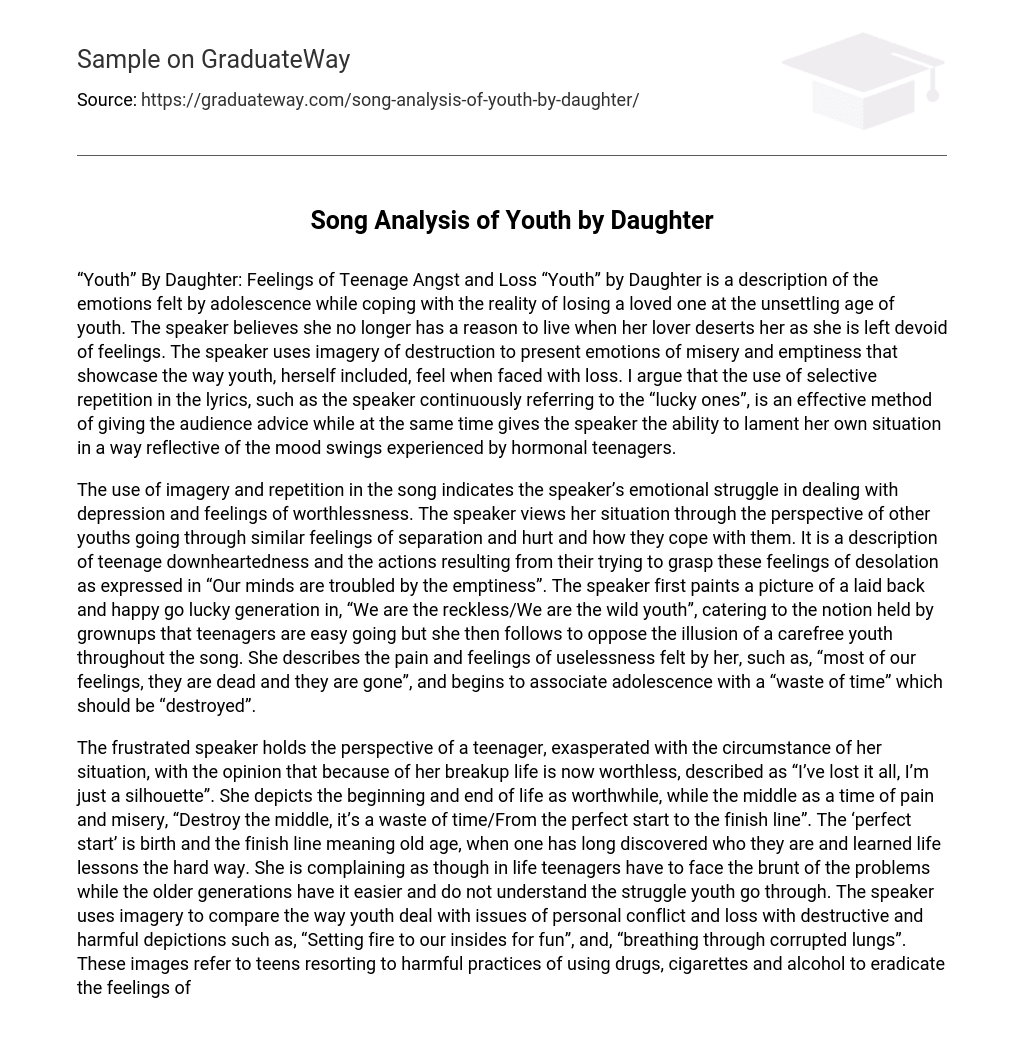“Youth” By Daughter: Feelings of Teenage Angst and Loss “Youth” by Daughter is a description of the emotions felt by adolescence while coping with the reality of losing a loved one at the unsettling age of youth. The speaker believes she no longer has a reason to live when her lover deserts her as she is left devoid of feelings. The speaker uses imagery of destruction to present emotions of misery and emptiness that showcase the way youth, herself included, feel when faced with loss. I argue that the use of selective repetition in the lyrics, such as the speaker continuously referring to the “lucky ones”, is an effective method of giving the audience advice while at the same time gives the speaker the ability to lament her own situation in a way reflective of the mood swings experienced by hormonal teenagers.
The use of imagery and repetition in the song indicates the speaker’s emotional struggle in dealing with depression and feelings of worthlessness. The speaker views her situation through the perspective of other youths going through similar feelings of separation and hurt and how they cope with them. It is a description of teenage downheartedness and the actions resulting from their trying to grasp these feelings of desolation as expressed in “Our minds are troubled by the emptiness”. The speaker first paints a picture of a laid back and happy go lucky generation in, “We are the reckless/We are the wild youth”, catering to the notion held by grownups that teenagers are easy going but she then follows to oppose the illusion of a carefree youth throughout the song. She describes the pain and feelings of uselessness felt by her, such as, “most of our feelings, they are dead and they are gone”, and begins to associate adolescence with a “waste of time” which should be “destroyed”.
The frustrated speaker holds the perspective of a teenager, exasperated with the circumstance of her situation, with the opinion that because of her breakup life is now worthless, described as “I’ve lost it all, I’m just a silhouette”. She depicts the beginning and end of life as worthwhile, while the middle as a time of pain and misery, “Destroy the middle, it’s a waste of time/From the perfect start to the finish line”. The ‘perfect start’ is birth and the finish line meaning old age, when one has long discovered who they are and learned life lessons the hard way. She is complaining as though in life teenagers have to face the brunt of the problems while the older generations have it easier and do not understand the struggle youth go through. The speaker uses imagery to compare the way youth deal with issues of personal conflict and loss with destructive and harmful depictions such as, “Setting fire to our insides for fun”, and, “breathing through corrupted lungs”. These images refer to teens resorting to harmful practices of using drugs, cigarettes and alcohol to eradicate the feelings of the “emptiness”. They use these self-harming habits as a way to rid themselves of the confusion of emotions and as a means to “distract our hearts from ever missing them”.
The speaker also uses dark images of blood, death, fire and a flood to explain the tragedy of her situation and the feelings of desolation she experiences. “If you’re still bleeding/You’re the lucky ones”, referring to the fact that she no longer feels jovial or full of life as the “reckless youth” she first portrayed, instead she feels lifeless. The speaker compares the loss of her lover as a “flood that wrecked our home”, and associates it with destroying the foundation that she built around him, without which she is bereft. She says she has become a “lifeless face” and “just a silhouette”, emphasizing the fact that she is no longer who she used to be, but that he has sucked the life out of her. The speaker also uses sensory imagery to show the emotional toll the separation has taken on her by saying, “My eyes are damp from the words you left/Ringing in my head”, even though he has left her she is so influenced by him and by the bitterness he has left behind that she can still physically hear the parting words he left her with. For the speaker, life has become too much, resulting in a sad and heart breaking breakdown where “you caused it” is repeated. The speaker constantly shifts between anger and sadness, reflective of fluctuating emotions of teenage hormones.
The speaker paints a bleak image of the youth of her generation who will, “die before he gets there”, meaning that they have lost hope. She invested so much into this relationship, as a naïve teenager that when things didn’t go her way, she feels as though she has “lost it all” and will be “forever missing him”. Based on the imagery and repetition present in “Youth”, the song is representative of feelings of angst and misery when dealing with the loss of a relationship. The song can also be construed as emotions regarding the death of a loved one, but I stand in my opinion of it being about the confusion of youth and of love lost and the entailing emotions experienced by developing youth and becoming comfortable with the changes and transition from childhood to adulthood. Work Cited





